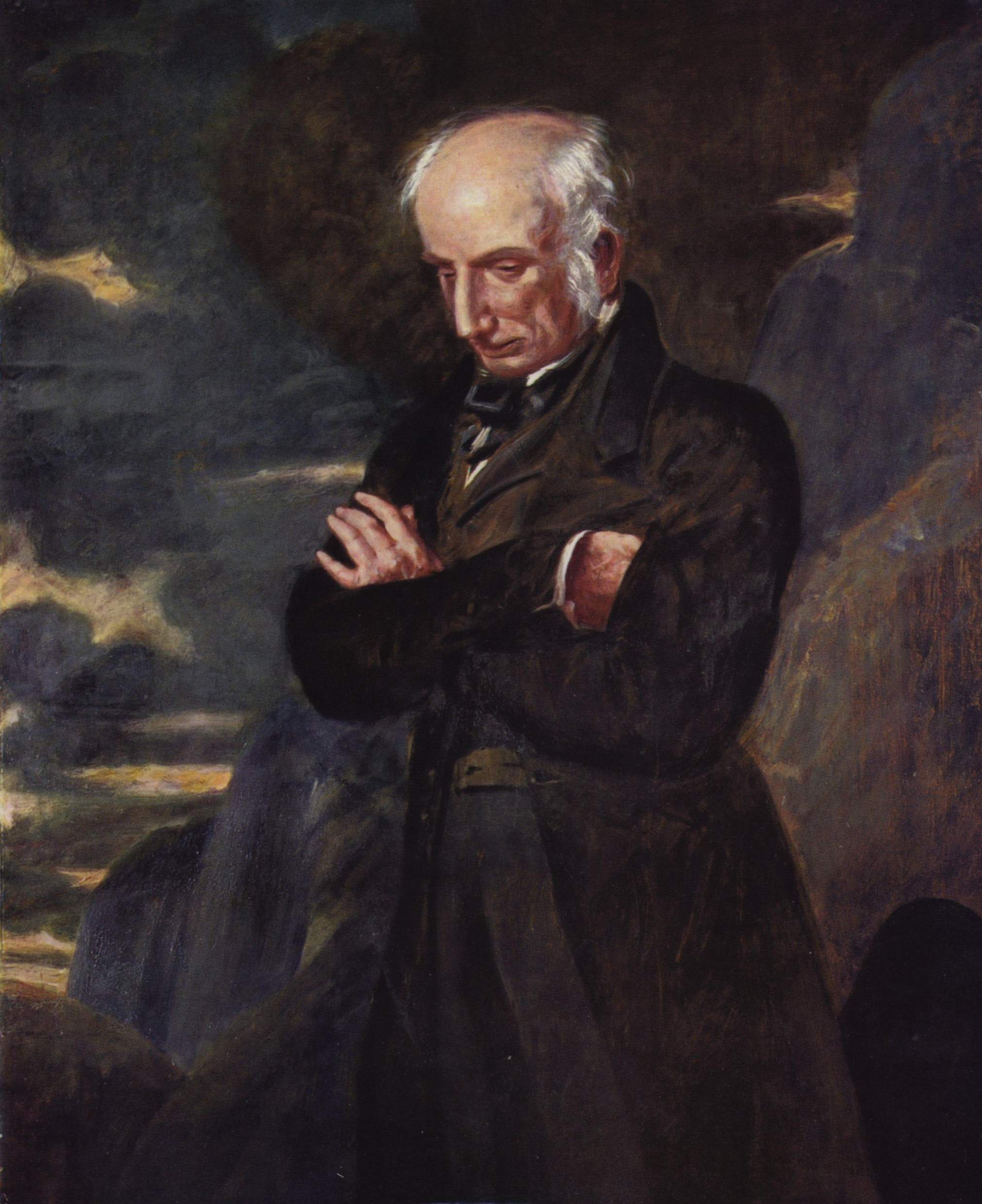“Los placeres recién descubiertos son dulces. Cuando mienten sobre nuestros pies.”
Fuente: To the Same Flower, capítulo 1 (1803).
William Wordsworth fue uno de los más importantes poetas románticos ingleses. Con Samuel Taylor Coleridge, contribuyó a la evolución de la época romántica en la literatura inglesa con su publicación conjunta de Baladas líricas en 1798. Esta obra influyó de modo determinante en el paisaje literario del siglo XIX. Fue el poeta laureado de Inglaterra desde 1843 hasta su muerte en 1850.
El carácter fuertemente innovador de su poesía, ambientada en el sugerente paisaje del Lake District , en el norte de Cumberland, radica en la elección de los protagonistas, personajes de humilde extracción, del tema, que es la vida cotidiana, y del lenguaje, sencillo e inmediato.
Wordsworth, Coleridge y Southey fueron conocidos como lakistas, por inspirarse en el mismo paisaje de los lagos.
Wikipedia

“Los placeres recién descubiertos son dulces. Cuando mienten sobre nuestros pies.”
Fuente: To the Same Flower, capítulo 1 (1803).
“Dulces dias infantiles, que eran siempre. Veinte días son ahora.”
Como una mariposa (I've Watched You Now a Full Half-Hour), sección. 2 (1801).
Fuente: http://www.gutenberg.org/browse/authors/w#a2879
“El arte es expresión de los sentimientos y emociones del artista.”
A Narrow Girdle of Rough Stones and Crags, l. 37 (1803).
Fuente: http://rpo.library.utoronto.ca/redirect/fromlink.cfm?new=poet/363.html
“Men are we, and must grieve when even the Shade
Of that which once was great, is passed away.”
On the Extinction of the Venetian Republic, l. 13 (1807).
Yarrow Unvisited.
Bartlett's Familiar Quotations, 10th ed. (1919)
“But who would force the soul tilts with a straw
Against a champion cased in adamant.”
Part III, No. 7 - Persecution of the Scottish Covenanters.
Ecclesiastical Sonnets (1821)
On the Extinction of the Venetian Republic, l. 1 (1807).
“A fingering slave,
One that would peep and botanize
Upon his mother's grave.”
Stanza 5.
A Poet's Epitaph (1799)
To the Daisy (third poem), st. 1 (1803).
Composed upon Westminster Bridge, Sept. 3, 1802, l. 11 (1802).
“A happy youth, and their old age
Is beautiful and free.”
The Fountain, st. ?? (1799).
Bartlett's Familiar Quotations, 10th ed. (1919)
Thoughts Suggested on the Banks of the Nith, st. 10.
Memorials of a Tour in Scotland (1803)
“A power is passing from the earth.”
Fuente: Bartlett's Familiar Quotations, 10th ed. (1919), Lines on the expected Dissolution of Mr. Fox.
Lines (1795)
Stanza 6.
Resolution and Independence (1807)
“Never to blend our pleasure or our pride
With sorrow of the meanest thing that feels.”
Hart-leap Well, part ii.
Bartlett's Familiar Quotations, 10th ed. (1919)
Part II, No. 17 - Wicliffe. In obedience to the order of the Council of Constance (1415), the remains of Wickliffe were exhumed and burned to ashes, and these cast into the Swift, a neighbouring brook running hard by; and "thus this brook hath conveyed his ashes into Avon, Avon into Severn, Severn into the narrow seas, they into the main ocean. And thus the ashes of Wickliffe are the emblem of his doctrine, which now is dispersed all the world over", Thomas Fuller, Church History, section ii, book iv, paragraph 53; Compare also: "What Heraclitus would not laugh, or what Democritus would not weep?… For though they digged up his body, burned his bones, and drowned his ashes, yet the word of God and truth of his doctrine, with the fruit and success thereof, they could not burn", Fox, Book of Martyrs, vol. i. p. 606 (edition, 1611); "Some prophet of that day said,—
"'The Avon to the Severn runs, / The Severn to the sea; / And Wickliffe's dust shall spread abroad / Wide as the waters be'", Daniel Webster, Address before the Sons of New Hampshire (1849), and similarly quoted by the Rev. John Cumming in the Voices of the Dead.
Ecclesiastical Sonnets (1821)
Stanza 2.
She Was a Phantom of Delight http://www.bartleby.com/145/ww259.html (1804)
Fuente: Character of the Happy Warrior http://www.bartleby.com/145/ww302.html (1806), Line 12.
To the Small Celandine.
Bartlett's Familiar Quotations, 10th ed. (1919)
Yes, It Was the Mountain Echo, st. 2 (1806).
“The budding rose above the rose full blown.”
Bk. XI, l. 121.
The Prelude (1799-1805)
Part III, No. 43 - Inside of King's College Chapel, Cambridge.
Ecclesiastical Sonnets (1821)
“Give all thou canst; high Heaven rejects the lore
Of nicely calculated less or more.”
Part III, No. 43 - Inside of King's College Chapel, Cambridge.
Ecclesiastical Sonnets (1821)
A Slumber Did My Spirit Seal (1799).
Lyrical Ballads (1798–1800)